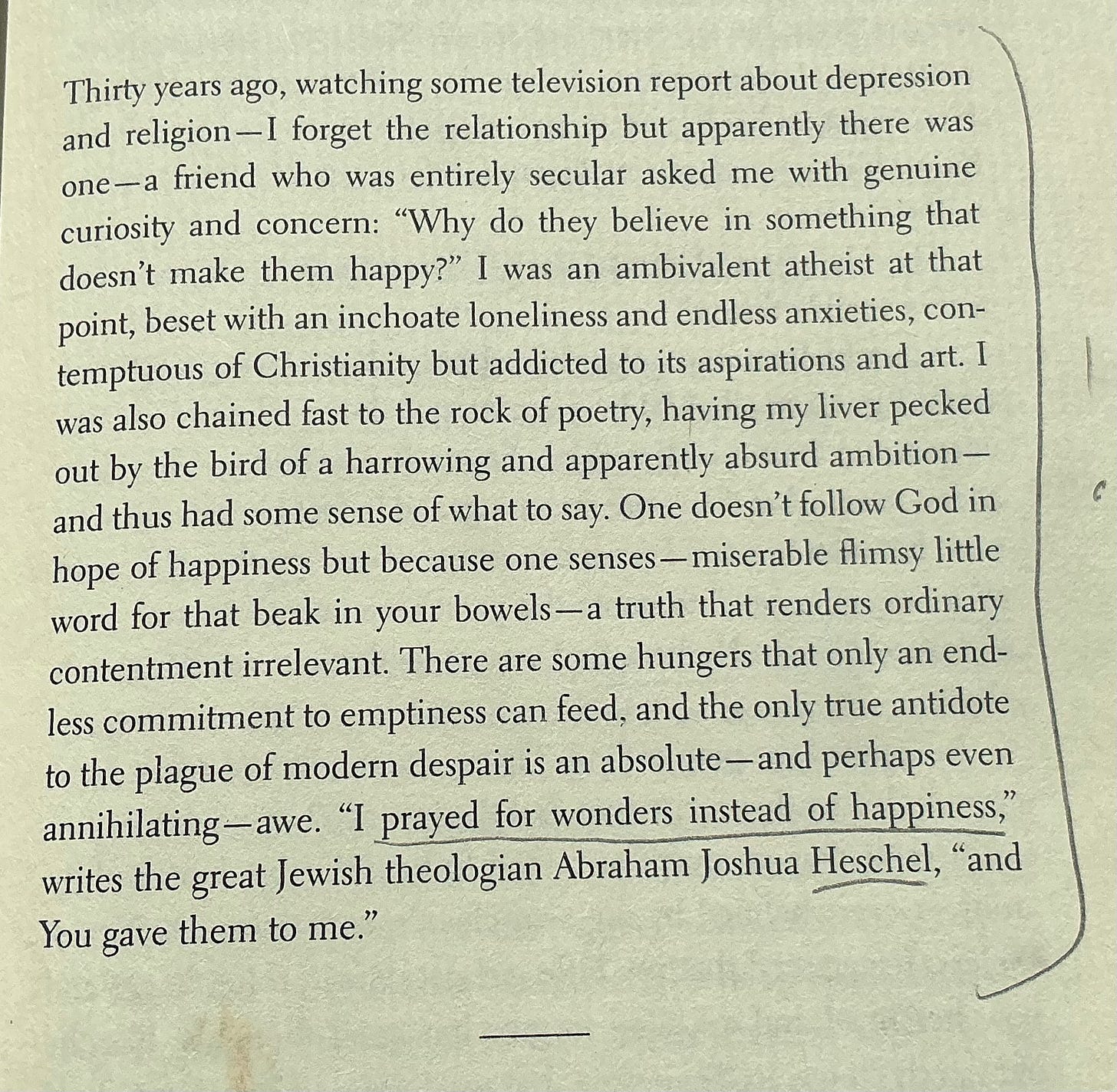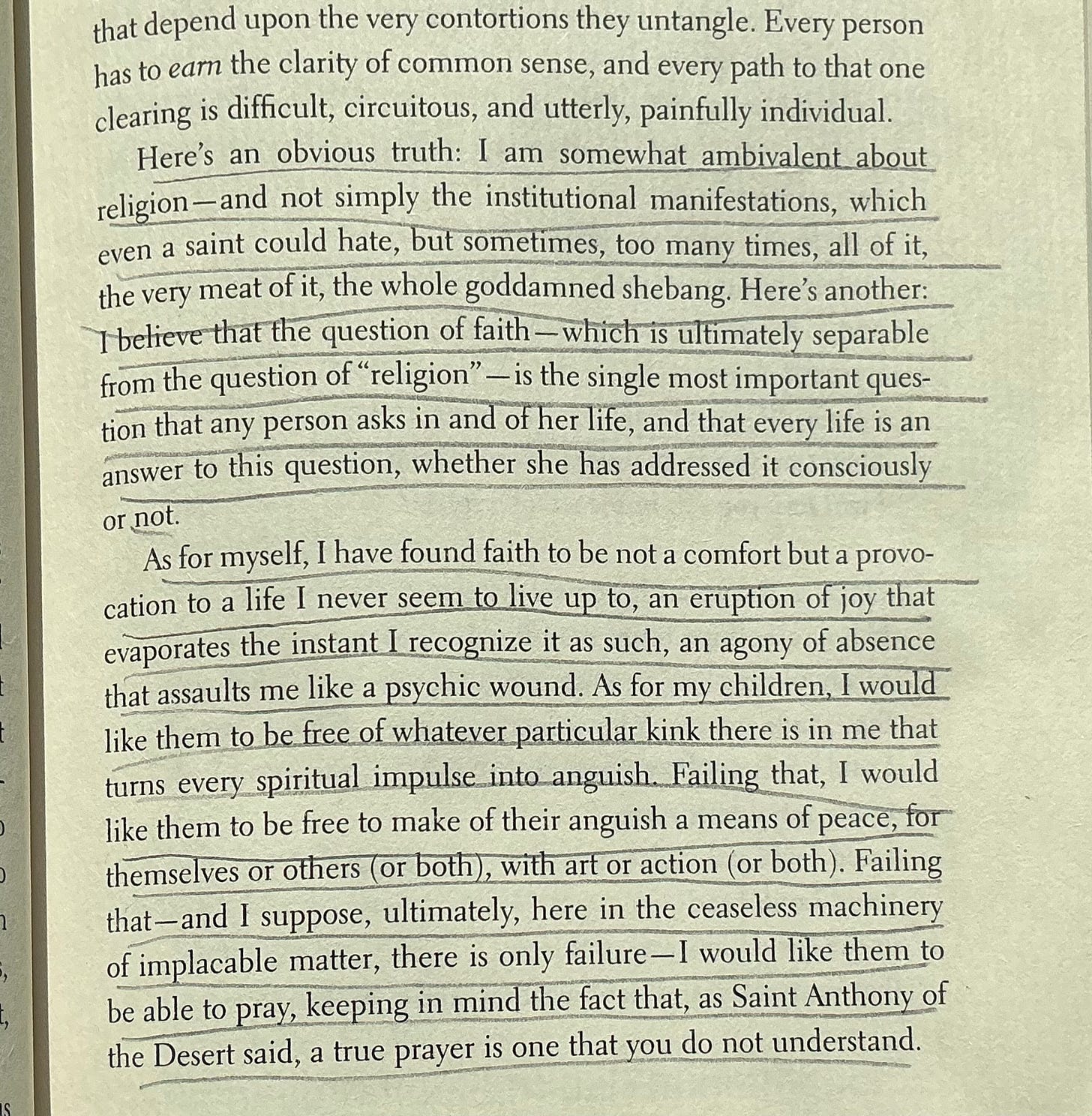Fragments from America
What we fear most may happen, so how then shall we live? Poems, prose and music which have been with me on the road
Dear readers,
I am writing to you from a mini-tour of the East coast of the USA. It has been a joy to meet some of you at various events, and I hope to see more before I go home. As you might imagine, I had mixed feelings about heading here, right now, and have been relieved to find again so much beauty and welcome, so many people of good will just quietly getting on with loving their neighbours. The headlines are never the whole picture, of course, but we can forget that. Also, American hospitality is a thing of beauty (I have stayed in the homes of strangers and friends and every one has gone above and beyond), there are amazing tacos, a can-do energy and extraordinary wisteria. For all of that I can forgive the common absence of kettles (no, I will not make tea in a microwave). The big stuff is not mine to forgive, anyway.
My schedule (and a desire to protect some family holiday time) means I have not got a proper essay for you this week, just some things that have been inspiring or steadying me. Let’s start with Faith Healing by Philip Larkin. I both love and hate Larkin, his slanted acerbic view is always astute but sometimes ungenerous. You get hints of that here (moustached!), but he also sees something profound:
Slowly the women file to where he standsUpright in rimless glasses, silver hair,Dark suit, white collar. Stewards tirelesslyPersuade them onwards to his voice and hands,Within whose warm spring rain of loving careEach dwells some twenty seconds. Now, dear child,What’s wrong, the deep American voice demands,And, scarcely pausing, goes into a prayerDirecting God about this eye, that knee.Their heads are clasped abruptly; then, exiledLike losing thoughts, they go in silence; someSheepishly stray, not back into their livesJust yet; but some stay stiff, twitching and loudWith deep hoarse tears, as if a kind of dumbAnd idiot child within them still survivesTo re-awake at kindness, thinking a voiceAt last calls them alone, that hands have comeTo lift and lighten; and such joy arrivesTheir thick tongues blort, their eyes squeeze grief, a crowdOf huge unheard answers jam and rejoice—What’s wrong! Moustached in flowered frocks they shake:By now, all’s wrong. In everyone there sleepsA sense of life lived according to love.To some it means the difference they could makeBy loving others, but across most it sweepsAs all they might have done had they been loved.That nothing cures. An immense slackening ache,As when, thawing, the rigid landscape weeps,Spreads slowly through them—that, and the voice aboveSaying Dear child, and all time has disproved.
“Within whose warm spring rain of loving care”. The picture of these women who (as I read it) are healed at least for a moment more by a moment of tenderness than any (other) supernatural intervention is exquisite.
I have also been sitting with this famous quote from the last page of Middlemarch, which I’ve been reading again. The book lands differently in my forties than my twenties. The idealism of the main character, Dorothea, seems more adorably foolish than it once did, but also, despite its sometime ridiculousness, more admirable. Also, I have long reasoned that the only reason seventeenth century polymath Blaise Pascal never married is because I happened to be born in a different timeline. I didn’t realise until this reading that Dorothea partly marries dull, self-important Edward Casaubon because “it would be like marrying Pascal.” Embarrassing. However:
But we insignificant people with our daily words and acts are preparing the lives of many Dorotheas, some of which may present a far sadder sacrifice than that of the Dorothea whose story we know….The effect of her being on those around her was incalculably diffusive: for the growing good of the world is partly dependent on unhistoric acts; and that things are not so ill with you and me as they might have been, is half owing to the number who lived faithfully a hidden life, and rest in unvisited tombs.
Virginia Woolf wrote that Middlemarch was one of the few English novels written for grown up people. It is indeed about growing up a soul, not just aging but deepening. Growing up our souls involves resisting the move from idealism to cynicism, from discomfort to disdain, overwhelm to withdrawal and numbing. Again and again, in rooms all over this hurting country we have been trying to name the space between denial and despair. Being a grown up means the ability to look the world in the face, in all its beauty and pain, to look the future in the face, with all its precariousness and promise and put our roots down deep in Love.
This is a poem by Joshua Luke Smith (Words in the Wild), who we recently recorded a Sacred podcast with which I cannot wait to share with you. I played this poem in Washington D.C. with a room full of disorientated change makers and it fell like a balm. I’d recommend listening to him read it on his meditative podcast, but the transcript is below.
Loss and longing, they're constants here in the Shadowlands.
What we fear most may happen, so how then shall we live?
We must stain God's shirt with tears, and announce how difficult it can feel to be here, but that we still are.
We must cut loose from self-sufficiency, and trust fall into grace.
We must protect ourselves from bitterness, and a cynical heart, and so we must keep forgiving.
We must trade in our armor for open arms, raised in surrender and praise, and a welcoming embrace.
We must hold ourselves captive in the high castle of hope, blinded by wonder, bound by joy, winded in reverence.
We must put ourselves in the way of awe and binge-worthy box sets.
We must not define our lives by our worst days, and neither should we by our best.
Most of life is in the middle.
We must enjoy each meal for the feast it is, and raise our glasses, making extravagant toasts on very ordinary days.
Though the ache remains, we keep loving.
The alternative is no alternative at all.
We keep living, one day at a time. One day at a time. One day at a time
Next, two sections from Christian Wiman’s most recent book, Zero at the Bone: Fifty Entries Against Despair:
Finally, because despite the themes here, I do not feel despair, and am seeing much beauty, let’s end with some music. These are from Bon Iver and Jacob Collier, two men who have been (aurally) accompanying me on this trip.
Photo by Matt Foxx on Unsplash








Thank you for this good post. I purposed to hear you last weekend at my daughter's church, St. Mo's, but I had guests. She sent me a link to your message , though, and it was a God sighting. I, too, love Christian Wiman and met him a few weeks ago at the Hopewords Writers' Conference. Thank you for coming to the U.S. I know we're messy and unattractive now, but we love our friends and neighbors who are willing to take the trouble to visit us in our affliction.
Thank you for your reflections - really appreciate the poem and will be coming back to it often.
And how fun to learn you are a Middlemarch fan! It has been my favorite novel for years, in particular for the following passage, which, I believe, speaks beautifully to learning to see those around us as sacred:
We are all of us born in moral stupidity, taking the world as an udder to feed our supreme selves: Dorothea had early begun to emerge from that stupidity, but yet it had been easier to her to imagine how she would devote herself to Mr. Casaubon, and become wise and strong in his strength and wisdom, than to conceive with that distinctness which is no longer reflection but feeling-- an idea wrought back to the directness of sense, like the solidity of objects--that he had an equivalent centre of self, whence the lights and shadows must always fall with a certain difference.